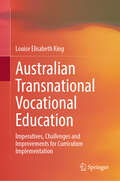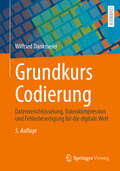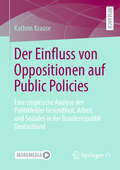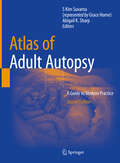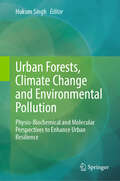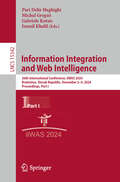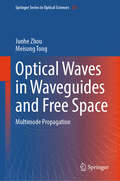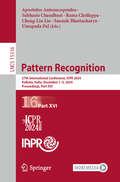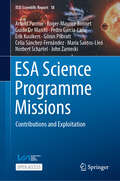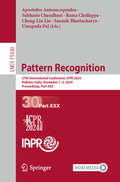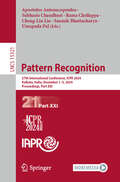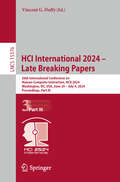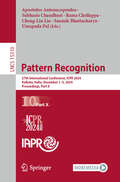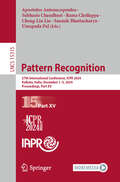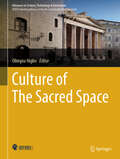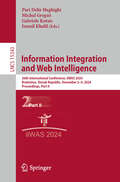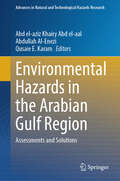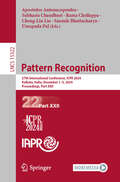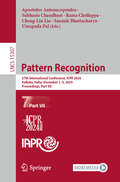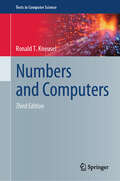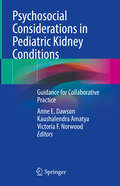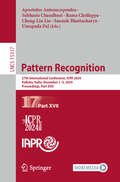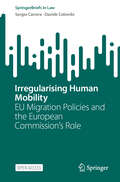- Table View
- List View
Australian Transnational Vocational Education: Imperatives, Challenges and Improvements for Curriculum Implementation
by Louise Elisabeth KingThis book explores questions about the relevance of implementing curriculum in transnational vocational education, in situations where teachers are expected to maintain standards in a country for which it was not designed. It provides a situational model of curriculum implementation that explains the complexity of factors that influence teachers’ enactment of the curriculum and how they engage in decision-making, problem-solving, and curriculum formation to overcome the constraints associated with implementation in transnational settings. It also proposes five improvements for strengthening the relevance, quality, and sustainability of transnational vocational education and the worth of vocational qualifications obtained by students internationally. This book serves as a helpful resource for teachers, curriculum developers, policymakers, educational managers, sponsors, students, regulators, academics, and anyone with an interest in transnational education, curriculum implementation, and/or teacher decision-making, as it provides a situational model of curriculum implementation and practical strategies for improving transnational programs in different teaching and learning contexts.
Grundkurs Codierung: Datenverschlüsselung, Datenkompression und Fehlerbeseitigung für die digitale Welt
by Wilfried DankmeierDieses Buch bietet aktuelles Wissen zu Codierungsverfahren und behandelt insbesondere die Korrektur von Datenübertragungs-Fehlern über Leitungen und Funk die Verschlüsselung die Datenkompression Ohne deren Einsatz wäre die heutige digitale Kommunikation in Internet, Mobilfunk, Radio und Fernsehen nicht möglich. Das Buch eignet sich besonders zum Einstieg in diese hoch modernen Fachgebiete. Dabei erhält der Leser einen ausführlichen Überblick und erleichtert sich zugleich das Verständnis für die umfangreiche weiterführende Literatur. Es setzt die bisherigen 4 Auflagen in überarbeiteter, bereinigter und mit neuen Verfahren aktualisierter Form fort. Das Buch entstand mit dem Material einer vielfach durchgeführten Vorlesung. Es wendet sich an Studierende der Nachrichten- und Informationstechnik, an Ingenieure, Informatiker und allgemein an alle, die sich für unsere Alltagstechnik interessieren.
Der Einfluss von Oppositionen auf Public Policies: Eine empirische Analyse der Politikfelder Gesundheit, Arbeit und Soziales in der Bundesrepublik Deutschland
by Dr.Kathrin KrauseEs bestand bis heute eine Forschungslücke innerhalb der Staatstätigkeitsforschung, da stets angenommen wurde, dass einzig Regierungsparteien Policies beeinflussen. Ein direkter Einfluss der Opposition wurde bis dato nicht empirisch analysiert. Diese Forschungslücke schließt die vorliegende Arbeit und weist auf Basis umfangreicher Datenanalysen und -berechnungen einen Einfluss der Opposition auf Bundesgesetze und -instrumente der Politikfelder Arbeit & Soziales sowie Gesundheit in den Jahren 1991 bis 2005 nach. Dieser wird insbesondere bei einer vorliegenden Zustimmungspflichtigkeit des Bundesrates und einer Oppositionsmehrheit in eben dieser Zweiten Kammer erstmalig empirisch nachgewiesen. Ebenso gelingt Oppositionseinfluss verstärkt bei Gesetzen, deren öffentliche und parlamentarische Salienz gering ausfällt.
Atlas of Adult Autopsy: A Guide to Modern Practice
by S. Kim Suvarna Abigail K. SharpThis new second edition of the successful 2016 Atlas of Adult Autopsy Practice is fully updated and refreshed with novel illustrations, and data refinements. It leads with pictures, focused text, and commentary on the autopsy itself as a specialist pathology subject. The content expands the coverage of specialist techniques with chapters covering post-mortem imaging, toxicology, neuropathology and forensic pathology from practising specialists. The addition of an original chapter addressing post-mortem histology adeptly contributes to the autopsy training literature. The book – a mainstay for the numerous practitioners working in this field, provides a standard for autopsy practice in the UK, Europe and beyond.
Urban Forests, Climate Change and Environmental Pollution: Physio-Biochemical and Molecular Perspectives to Enhance Urban Resilience
by Hukum SinghThis book contributes significantly to the international literature by bringing forth a novel and comprehensive exploration of urban resilience in the face of climate change and environmental pollution. Its focus on integrating physiological, biochemical, and molecular dimensions distinguishes it from existing literature. The book offers several key contributions, including an interdisciplinary approach to understanding the complex interactions within urban ecosystems. It includes cutting-edge insights that have not been extensively explored in existing literature, practical applications, and evidence-based strategies to enhance urban sustainability and resilience. The book has a global relevance to a diverse international readership and provides strategic guidance to policymakers and urban planners when making decisions to develop evidence-based strategies that cater to the specific challenges of cities. Urban forests play a critical role in enhancing the resilience of cities by providing numerous benefits, including improved air quality, reduced urban heat island effect, and enhanced biodiversity, ultimately improving urban health. Besides, urban forests are a crucial natural-based solution (NbS) to mitigate air pollution and climate change impacts in cities. However, in the face of climate change and environmental pressures, urban forests face significant challenges to their survival and functionality. This book explores the complex morpho-physio-biochemical and molecular changes that enable urban forests to flourish amidst climate change and environmental pollution. It examines how urban trees modulate their morphological structures, including root systems and physiological and biochemical functioning, and molecular alterations to withstand changing urban climatic and environmental conditions.
Information Integration and Web Intelligence: 26th International Conference, iiWAS 2024, Bratislava, Slovak Republic, December 2–4, 2024, Proceedings, Part I (Lecture Notes in Computer Science #15342)
by Ismail Khalil Michal Greguš Gabriele Kotsis Pari Delir HaghighiThe two-volume set LNCS 15342 and 15343 constitutes the refereed proceedings of the 26th International Conference on Information Integration and Web Intelligence, iiWAS 2024, held in Bratislava, Slovak Republic, during December 2–4, 2024. The 27 revised full papers and 25 short papers are presented in these proceedings were carefully reviewed and selected from 92 submissions. The papers are organized in the following topical sections: Volume I: Web Intelligence, Language Models, and AI-based Question Answering; Blockchain, Peer Reviews, and Digital Transparency; Machine Learning in Healthcare, Climate Change, and Human Behavior; Sequence and Similarity Search Techniques; and Knowledge Graphs, Databases, and Ontologies. Volume II: Recommender Systems and Data Personalization; Digital Forensics, Journalism, and Echo Chambers; Human-Computer Interaction, Music Therapy, and User-Centric Systems; and Environmental and Geological Data Science.
Optical Waves in Waveguides and Free Space: Multimode Propagation (Springer Series in Optical Sciences #251)
by Junhe Zhou Meisong TongThis book provides a thorough review of multi-mode propagation inside optical waveguides and free space, which is receiving particular attention for its promising applications in communications and sensing. At the heart of the book is the matter of how modes couple and interfere due to engineered or random index fluctuations, forming functional devices. The chapters cover topics such as multi-mode interference, coupled mode theory, and mode generation. Readers discover how a universal coupled mode theory can describe mode propagation, enabling stochastic analysis and avoiding time-consuming simulations. The book also delves into mode division multiplexing systems and digital signal processing (DSP) algorithm-enabled multiple-input multiple-output (MIMO) transmission in multi-mode systems. Researchers in the field of optical communications and for physicists and engineers will find this book to be invaluable. It offers a comprehensive review of multi-mode transmission systems' basic physics and applications, making it essential for anyone interested in advancing their understanding of this rapidly expanding field.
Pattern Recognition: 27th International Conference, ICPR 2024, Kolkata, India, December 1–5, 2024, Proceedings, Part XVI (Lecture Notes in Computer Science #15316)
by Rama Chellappa Subhasis Chaudhuri Cheng-Lin Liu Umapada Pal Apostolos Antonacopoulos Saumik BhattacharyaThe multi-volume set of LNCS books with volume numbers 15301-15333 constitutes the refereed proceedings of the 27th International Conference on Pattern Recognition, ICPR 2024, held in Kolkata, India, during December 1–5, 2024. The 963 papers presented in these proceedings were carefully reviewed and selected from a total of 2106 submissions. They deal with topics such as Pattern Recognition; Artificial Intelligence; Machine Learning; Computer Vision; Robot Vision; Machine Vision; Image Processing; Speech Processing; Signal Processing; Video Processing; Biometrics; Human-Computer Interaction (HCI); Document Analysis; Document Recognition; Biomedical Imaging; Bioinformatics.
ESA Science Programme Missions: Contributions and Exploitation (ISSI Scientific Report Series #18)
by Roger-Maurice Bonnet Göran Pilbratt Arvind Parmar Guido De Marchi Pedro García-Lario Erik Kuulkers Celia Sánchez-Fernández Maria Santos-Lleó Norbert Schartel John ZarneckiThis work got its start by trying to answer the question "how do you evaluate the scientific performance of the ESA's Science Programme missions?" For many years, the decision makers responsible for the content of the ESA Science Programme have been provided with information for each mission including, but not limited to, the number of publications published, the number of publications that are highly cited, the total number of citations used, various statistical metrics and the number of unique author names. However, this reporting only provides snapshots of these missions and was not widely distributed. In this book, we report on a systematic study of these metrics and their evolution with time to provide insights into mission successes and the communities exploiting the data provided by the Science Programme’s missions. In addition, we examine the outcomes of the announcements of observing opportunities for ESA’s observatory missions, INTEGRAL, Herschel and XMM-Newton to provide insights into the evolutions of the user communities with time, location and gender. Finally, we examine the provision of payload elements for ESA’s Science Programme missions. We use the number of payload investigators to give insights into the levels of contribution and exploitation of the different ESA Member States. This book is open access under a CC BY license.
Pattern Recognition: 27th International Conference, ICPR 2024, Kolkata, India, December 1–5, 2024, Proceedings, Part XXX (Lecture Notes in Computer Science #15330)
by Rama Chellappa Subhasis Chaudhuri Cheng-Lin Liu Umapada Pal Apostolos Antonacopoulos Saumik BhattacharyaThe multi-volume set of LNCS books with volume numbers 15301-15333 constitutes the refereed proceedings of the 27th International Conference on Pattern Recognition, ICPR 2024, held in Kolkata, India, during December 1–5, 2024. The 963 papers presented in these proceedings were carefully reviewed and selected from a total of 2106 submissions. They deal with topics such as Pattern Recognition; Artificial Intelligence; Machine Learning; Computer Vision; Robot Vision; Machine Vision; Image Processing; Speech Processing; Signal Processing; Video Processing; Biometrics; Human-Computer Interaction (HCI); Document Analysis; Document Recognition; Biomedical Imaging; Bioinformatics.
Culture in Exile: Comparative Perspectives on Nazi Germany and Francoist Spain
by Elisenda MarcerThis edited book breaks new ground by bringing together research on inner and territorial exile in the context of National Socialism in Germany and the Franco regime in Spain, and in proposing an integrated model of exilic cultural production. Original contributions explore previously neglected aspects of the inner and territorial exile cultures, focusing on the specificity of the national settings (including Catalonia) whilst also seeking to place research findings within a conceptual framework of exile which views the experiences and cultural manifestations of inner and territorial exiles not as polar opposites, but as interactions of response to fascist dictatorship. This book will be of interest to scholars and students of German Studies, Hispanic Studies, comparative literary and cultural studies, and modern history more broadly.
Pattern Recognition: 27th International Conference, ICPR 2024, Kolkata, India, December 1–5, 2024, Proceedings, Part XXI (Lecture Notes in Computer Science #15321)
by Rama Chellappa Subhasis Chaudhuri Cheng-Lin Liu Umapada Pal Apostolos Antonacopoulos Saumik BhattacharyaThe multi-volume set of LNCS books with volume numbers 15301-15333 constitutes the refereed proceedings of the 27th International Conference on Pattern Recognition, ICPR 2024, held in Kolkata, India, during December 1–5, 2024. The 963 papers presented in these proceedings were carefully reviewed and selected from a total of 2106 submissions. They deal with topics such as Pattern Recognition; Artificial Intelligence; Machine Learning; Computer Vision; Robot Vision; Machine Vision; Image Processing; Speech Processing; Signal Processing; Video Processing; Biometrics; Human-Computer Interaction (HCI); Document Analysis; Document Recognition; Biomedical Imaging; Bioinformatics.
HCI International 2024 – Late Breaking Papers: 26th International Conference on Human-Computer Interaction, HCII 2024, Washington, DC, USA, June 29 – July 4, 2024, Proceedings, Part III (Lecture Notes in Computer Science #15376)
by Vincent G. DuffyThis nine-volume set LNCS 15473-15482 constitutes the proceedings of the 26th International Conference, HCI International 2023, in Washington, DC, USA, in June/July 2024. For the HCCII 2024 proceedings, a total of 1271 papers and 309 posters was carefully reviewed and selected from 5108 submissions. Additionally, 222 papers and 104 posters are included in the volumes of the proceedings published after the conference, as “Late Breaking Work”. These papers were organized in the following topical sections: HCI Theories, Methods and Tools; Multimodal Interaction; Interacting with Chatbots and Generative AI; Interacting in Social Media; Fintech, Consumer Behavior and the Business Environment; Design for Health and Wellbeing; Ergonomics and Digital Human Modelling; Virtual Experiences in XR and the Metaverse; Playing Experiences; Design for Learning; New Cultural and Tourism Experiences; Accessibility and Design for All; Design for Older Adults; User Experience Design and Evaluation: Novel Approaches and Case Studies; Safety, Security and Privacy; HCI in Automated Vehicles and Automotive; HCI in Aviation, Transport and Safety; Human-Centered AI; AI for Decision Making and Sentiment Analysis.
Pattern Recognition: 27th International Conference, ICPR 2024, Kolkata, India, December 1–5, 2024, Proceedings, Part X (Lecture Notes in Computer Science #15310)
by Rama Chellappa Subhasis Chaudhuri Cheng-Lin Liu Umapada Pal Apostolos Antonacopoulos Saumik BhattacharyaThe multi-volume set of LNCS books with volume numbers 15301-15333 constitutes the refereed proceedings of the 27th International Conference on Pattern Recognition, ICPR 2024, held in Kolkata, India, during December 1–5, 2024. The 963 papers presented in these proceedings were carefully reviewed and selected from a total of 2106 submissions. They deal with topics such as Pattern Recognition; Artificial Intelligence; Machine Learning; Computer Vision; Robot Vision; Machine Vision; Image Processing; Speech Processing; Signal Processing; Video Processing; Biometrics; Human-Computer Interaction (HCI); Document Analysis; Document Recognition; Biomedical Imaging; Bioinformatics.
Pattern Recognition: 27th International Conference, ICPR 2024, Kolkata, India, December 1–5, 2024, Proceedings, Part XV (Lecture Notes in Computer Science #15315)
by Rama Chellappa Subhasis Chaudhuri Cheng-Lin Liu Umapada Pal Apostolos Antonacopoulos Saumik BhattacharyaThe multi-volume set of LNCS books with volume numbers 15301-15333 constitutes the refereed proceedings of the 27th International Conference on Pattern Recognition, ICPR 2024, held in Kolkata, India, during December 1–5, 2024. The 963 papers presented in these proceedings were carefully reviewed and selected from a total of 2106 submissions. They deal with topics such as Pattern Recognition; Artificial Intelligence; Machine Learning; Computer Vision; Robot Vision; Machine Vision; Image Processing; Speech Processing; Signal Processing; Video Processing; Biometrics; Human-Computer Interaction (HCI); Document Analysis; Document Recognition; Biomedical Imaging; Bioinformatics.
Culture of The Sacred Space (Advances in Science, Technology & Innovation)
by Olimpia NiglioThis book highlights the relationship between sacred architecture and tourism, specifically focusing on the role of interior design strategies. It explores how the interior design of sacred spaces can influence the tourist experience and shape their perception of these places. The book touches upon elements such as spatial organization, symbolism, material selection, lighting, and acoustics, all of which contribute to creating a meaningful and immersive environment for visitors. It explores the architectural design, ideological motivations, and the historical context surrounding the palace's construction. The book also addresses the eventual abandonment of the project and its transformation of their uses, reflecting on the complexities of realizing utopian visions in architecture. It examines how the sanctuary's architectural design and spatial arrangement interact with the surrounding landscape, including elements such as topography, vegetation, and water features. Moreover, it focuses on the interior design and explores the symbolism, spatial organization, artistic elements, and spiritual experiences associated with the dome interiors of these structures. The book showcases the historical context, cultural influences, and the evolution of design principles that shaped these remarkable spaces. Also, this book investigates the transition of visionary architectural drawings from the realm of professional architects. Furthermore, it explores how architectural drawings serve as a medium for expressing imaginative and utopian ideas, and how this transition occurs in the context of architectural education.
Information Integration and Web Intelligence: 26th International Conference, iiWAS 2024, Bratislava, Slovak Republic, December 2–4, 2024, Proceedings, Part II (Lecture Notes in Computer Science #15343)
by Ismail Khalil Michal Greguš Gabriele Kotsis Pari Delir HaghighiThe two-volume set LNCS 15342 and 15343 constitutes the refereed proceedings of the 26th International Conference on Information Integration and Web Intelligence, iiWAS 2024, held in Bratislava, Slovak Republic, during December 2–4, 2024. The 27 revised full papers and 25 short papers are presented in these proceedings were carefully reviewed and selected from 92 submissions. The papers are organized in the following topical sections: Volume I: Web Intelligence, Language Models, and AI-based Question Answerin; Blockchain, Peer Reviews, and Digital Transparency; Machine Learning in Healthcare, Climate Change, and Human Behavior; Sequence and Similarity Search Techniques; and Knowledge Graphs, Databases, and Ontologies. Volume II: Recommender Systems and Data Personalization; Digital Forensics, Journalism, and Echo Chambers; Human-Computer Interaction, Music Therapy, and User-Centric Systems; and Environmental and Geological Data Science.
Environmental Hazards in the Arabian Gulf Region: Assessments and Solutions (Advances in Natural and Technological Hazards Research #54)
by Abd el-aziz Khairy Abd el-aal Abdullah Al-Enezi Qusaie E. KaramThis book discusses the environmental hazards in the Gulf countries (GCC). The publication of this book is of great importance to all those interested and knowledgeable in the field. Climate change leads to the occurrence of major environmental hazards that must be reduced by estimating the extent of climate change and developing appropriate solutions to mitigate those effects. Climate changes are produced indirectly as a result of human activities with uncalculated consequences. The process of climate change is always accompanied by catastrophic environmental problems such as global warming, high temperatures, storms, hurricanes, floods, desertification processes, air pollution, and the extinction of many types and forms of animals and plants. The Gulf countries are located in the eastern part of the Arabian Peninsula where the crude oil is extracted in several fields. The states suffer from many environmental problems as a result of its geographical location, global climate change, and also from oil extraction operations. The problems include high temperatures, induced earthquakes, and pollution in the soil and marine coast, as well as desertification processes, sand dunes movement, and other environmental problems. Earthquakes are also recorded from and near the oil fields, indicating the link between the oil extraction process and the occurrence of earthquakes. Indeed, the environmental studies published in the Gulf state are very few and do not meet the need of the scientific community in region which need more important environmental publications that help in the great and rapid urban developments in the area.
Pattern Recognition: 27th International Conference, ICPR 2024, Kolkata, India, December 1–5, 2024, Proceedings, Part XXII (Lecture Notes in Computer Science #15322)
by Rama Chellappa Subhasis Chaudhuri Cheng-Lin Liu Umapada Pal Apostolos Antonacopoulos Saumik BhattacharyaThe multi-volume set of LNCS books with volume numbers 15301-15333 constitutes the refereed proceedings of the 27th International Conference on Pattern Recognition, ICPR 2024, held in Kolkata, India, during December 1–5, 2024. The 963 papers presented in these proceedings were carefully reviewed and selected from a total of 2106 submissions. They deal with topics such as Pattern Recognition; Artificial Intelligence; Machine Learning; Computer Vision; Robot Vision; Machine Vision; Image Processing; Speech Processing; Signal Processing; Video Processing; Biometrics; Human-Computer Interaction (HCI); Document Analysis; Document Recognition; Biomedical Imaging; Bioinformatics.
Pattern Recognition: 27th International Conference, ICPR 2024, Kolkata, India, December 1–5, 2024, Proceedings, Part VII (Lecture Notes in Computer Science #15307)
by Rama Chellappa Subhasis Chaudhuri Cheng-Lin Liu Umapada Pal Apostolos Antonacopoulos Saumik BhattacharyaThe multi-volume set of LNCS books with volume numbers 15301-15333 constitutes the refereed proceedings of the 27th International Conference on Pattern Recognition, ICPR 2024, held in Kolkata, India, during December 1–5, 2024. The 963 papers presented in these proceedings were carefully reviewed and selected from a total of 2106 submissions. They deal with topics such as Pattern Recognition; Artificial Intelligence; Machine Learning; Computer Vision; Robot Vision; Machine Vision; Image Processing; Speech Processing; Signal Processing; Video Processing; Biometrics; Human-Computer Interaction (HCI); Document Analysis; Document Recognition; Biomedical Imaging; Bioinformatics.
Fachdidaktik Chemie in Theorie und Praxis
by Bernhard F. Sieve Jürgen Paul Sascha SchanzeSind Sie angehende Chemielehrkraft im Studium, im Referendariat oder haben Sie den Weg des Quereinstiegs gewählt und suchen nach einem Lehr- und Arbeitsbuch, das Ihnen einen fundierten Einblick in die aktuelle forschungsbasierte und praxiserprobte Chemiedidaktik liefert? Dann halten Sie mit der Fachdidaktik Chemie in Theorie und Praxis genau das passende Buch in den Händen. Auf der Basis aktueller Forschungsergebnisse aus nationalen und internationalen Studien werden wesentliche Aspekte zum Lehren und Lernen von Chemie vermittelt und daraus konkrete, evidenzbasierte Folgerungen für die Planung, Durchführung und Reflexion von Chemieunterricht abgeleitet. Jedes Kapitel wurde im Tandem aus Fachdidaktiker:innen und Chemielehrkräften entwickelt, um die chemiedidaktische Theorie eng mit der realen Unterrichtpraxis zu verschränken. Die Fachdidaktik Chemie in Theorie und Praxis ist ein Lehr- und Arbeitsbuch: Eine authentische Lehr-Lernsituation aus dem Chemieunterricht oder der Lehrkräftebildung holt Sie als Leser:innen ab und macht die Relevanz des jeweiligen Kapitelthemas für den Chemieunterricht und die Lehrkräftebildung deutlich. Gleichzeitig ergeben sich aus den Situationen Leitfragen, die die Kernaspekte des jeweiligen Themas umspannen. Übungs- und Reflexionsaufgaben regen in jedem Kapitel zur individuellen inhaltlichen Auseinandersetzung mit dem Thema an und unterstützen Ihre Selbstreflexion. Lösungshinweise zu den Aufgaben finden sich im Onlinematerial. Erprobte Praxisbeispiele und Praxistipps konkretisieren theoretische Ausführungen und unterstützen Sie bei der Gestaltung und Reflexion Ihres eigenen Chemieunterrichts. Ein großer Fundus an erprobten und evaluierten Onlinematerialien ergänzt die Praxisbeispiele. Fachdidaktik Chemie in Theorie und Praxis – ein Muss in der fachdidaktischen Ausbildung und für jede Chemielehrkraft.
Numbers and Computers (Texts in Computer Science)
by Ronald T. KneuselThis textbook details the variety of number formats used by computers, thereby helping to ground readers in what can and cannot be represented accurately, especially by floating-point numbers. The book's first part details standard representations of integers and floating-point numbers. The second explores other number representations, including the wide variety recently developed to support artificial intelligence (AI) and its demand for efficiency in representation to accommodate the ever-expanding scope of neural network models. Chapters describe each format, with examples in code (Python and C) and exercises. This new edition includes three new chapters on posits, AI number formats, and a collaborative experiment with an AI to generate novel number formats. Topics and features: Explores how computers use numbers to complete operations Adds new chapters on posits and AI number formats Includes exercises and examples that are code snippets in C or Python Implements and tests new AI-designed number formats (as designed by GPT-4) Provides thorough grounding on what can and cannot be represented accurately A textbook eminently suitable for undergraduates in computer science, the work also will appeal to software developers, engineers, scientists, AI experts, and anyone who programs for fun.
Psychosocial Considerations in Pediatric Kidney Conditions: Guidance for Collaborative Practice
by Anne E. Dawson Kaushalendra Amatya Victoria F. NorwoodThis book explores the psychosocial impacts of the kidney disease process and treatments on pediatric patients, including child development, schooling, coping, and resilience. Chronic illnesses and invasive treatments can be particularly impactful on children’s development and identity formation, and a multidisciplinary treatment model that takes psychosocial considerations into account is imperative for patients’ overall wellbeing. This book covers both specific disease-related concerns, including dialysis, transplantation, and nutrition, and broader issues such as collaborating with schools, supporting families, advocacy, and the transition to adult healthcare. Written by experts in a rapidly developing area, this book is an excellent resource for all people impacted by and involved in caring for pediatric kidney diseases including practicing nephrologists and nephrologists in training, as well as psychosocial providers serving nephrology patients, and even families and patients themselves.
Pattern Recognition: 27th International Conference, ICPR 2024, Kolkata, India, December 1–5, 2024, Proceedings, Part XVII (Lecture Notes in Computer Science #15317)
by Rama Chellappa Subhasis Chaudhuri Cheng-Lin Liu Umapada Pal Apostolos Antonacopoulos Saumik BhattacharyaThe multi-volume set of LNCS books with volume numbers 15301-15333 constitutes the refereed proceedings of the 27th International Conference on Pattern Recognition, ICPR 2024, held in Kolkata, India, during December 1–5, 2024. The 963 papers presented in these proceedings were carefully reviewed and selected from a total of 2106 submissions. They deal with topics such as Pattern Recognition; Artificial Intelligence; Machine Learning; Computer Vision; Robot Vision; Machine Vision; Image Processing; Speech Processing; Signal Processing; Video Processing; Biometrics; Human-Computer Interaction (HCI); Document Analysis; Document Recognition; Biomedical Imaging; Bioinformatics.
Irregularising Human Mobility: EU Migration Policies and the European Commission’s Role (SpringerBriefs in Law)
by Sergio Carrera Davide ColombiThis is an open access book. What is the history and current state of play of EU law and policy covering irregularised human mobility? What has been the role and contributions of the 2019-2024 European Commission as regards EU migration policy? This book investigates how migration policies have been problematised at the EU institutional level, in particular by the European Commission. It critically assesses the assumptions lying behind the Commission’s political priorities, agendas and policy outputs. Through the concept of irregularity assemblages, the book examines how EU policy professionals and bureaucracies in the relevant Commission services problematise their respective mandates/portfolios; how they interact with each other and even compete; and how they frame certain forms of human mobility as being an ‘irregular migration problem’ or not. After retracing key historical developments in the framing of irregularised human mobilities at the EU level, the book identifies six policy approaches in the work and structures of the 2019-2024 European Commission. It finds that a home affairs and criminalisation approach that prioritises a law enforcement understanding of cross-border and intra-EU mobility, and pursuing a Ministry of Interior-like agenda, has prevailed. This approach stands at odds with human dignity and other legitimate public policy approaches, such as those giving priority to employment and social inclusion, non-discrimination, and fundamental rights, where the administrative migration status of the individual is not the entry point. The overriding priority driving EU migration policy has been the expulsion, policing and criminalisation of people framed or categorised as ‘irregular migrants’. The analysis shows how Commission has failed to effectively perform its role as guardian of the Treaties and unequivocally enforce and comply with EU Treaty constitutive values, EU law and Better Regulation commitments in migration policies.
